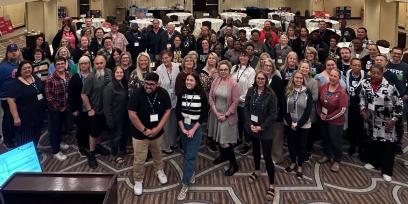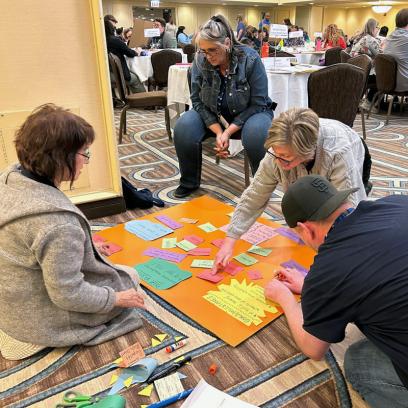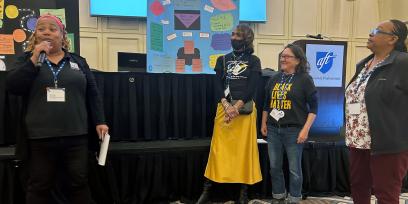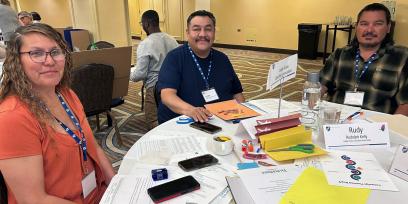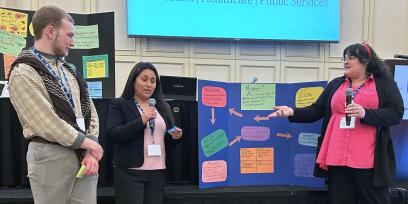They came to Chicago for the PSRP leadership conference: pre-K to college paraprofessionals and school-related personnel of every job description, from every corner of the nation. Paras and clerical workers from Illinois sat next to a Montana local representing custodians and playground workers. A school bus driver from Alabama sat one table away from an Oklahoma library assistant. PSRPs from Oregon next to PSRPs from New York and California next to PSRPs from Florida and Michigan.
They were there April 19-21 to hone their leadership, celebrate their wins and map out ways to turn around their losses. For starters, they learned how to advocate for a national PSRP Bill of Rights, introduced in Congress and with growing support, that would elevate the role of school and college support staff.
In 20 small teams, they imagined next how their local unions, together with their state federations, could drive these six goals: living wages, safe working conditions, affordable healthcare, appropriate training and supplies, job security and paid leave. The teams were chosen based on being newly organized, under-resourced, less exposed to AFT training or having new executive boards.
On the topic of living wages—well, most support staff have to work at least two jobs and most struggle. Incoming PSRP chair Carl Williams raised the stakes. “We don’t just need a livable wage,” declared the AFT vice president who also is president of the Lawndale (Calif.) Federation of Classified Employees. “We need an enjoyable wage.”
PSRPs also are fed up with the lack of job security. When school ends every spring, they are sick and tired of not knowing whether they’ll have a job over the summer—or indeed, when school starts again in the fall—while knowing that if either of those jobs falls through, they won’t be able to feed their families. Enough, they say, with being labeled “temporary” employees when they’ve been a foundational part of their schools, sometimes for decades.
Healthcare insurance for school and college support staff varies among states and even institutions. But across America, the picture is much the same. What should be a universal right to healthcare often is nothing at all. Many school bus drivers, for instance, turn over their whole paycheck to cover insurance premiums. They’re only working for insurance. And the public wonders why there’s a shortage of school bus drivers?
The PSRP leaders said they shouldn’t have to weigh going to the doctor versus paying for food and shelter. Americans need universal healthcare, they said, just like every other wealthy nation in the world.
The need for classroom supplies has remained in the public eye ever since it became widely known that educators spend an average of $500 per year of their own money on supplies. Even the kinds of necessary supplies have grown. Despite horrific working conditions during the pandemic, at least staff eventually were supplied with personal protective equipment. Now that the pandemic is considered over, staff are no longer getting PPE.
And the need goes well beyond supplies, the PSRPs said. They need appropriate training, too, including courses in de-escalation, how to curb bullying and harassment, active shooter training, suicide prevention, IEP access for special education paras, and medical training for employees required to handle students’ catheters and feeding tubes.
Safe working conditions dominated the leadership conference because violent behavior among students has risen since the pandemic, the PSRP leaders said. And now this behavior includes violence among adults: parents assaulting staff members and staff assaulting each other.
When it comes to paid leave, the PSRPs could only swap stories about desperately needing paid time off to take care of themselves and their families. Thoroughly incensed, they turned to planning campaigns.
Pro tip: Have a plan
With help from AFT staff, the teams began considering where they are as PSRPs in their schools and colleges, where they’ve been and where they want to go. They also visualized the future they want. They used the SWOT method to evaluate their strengths, weaknesses, opportunities and threats.
Examples of opportunities they identified included collective bargaining in Fairfax County, Va., and internal organizing in San Francisco. Threats included the conservative Freedom Foundation, which once again is leafletting anti-union messages in the Pacific Northwest, and school administrators in Chicago who treat PSRPs as “less than.” In the words of one attendee: “We’re looked at as the lowest ones.”
Up-and-coming leaders in Oklahoma City saw in their situation both a weakness, in that their local leadership is entirely new, and an opportunity, in that their new members are “agitated and ready to make change.”
From there, they moved on to planning a campaign, holding organizing conversations, mapping and charting, integrating the community into their campaigns and amplifying their message—recognizing that, as with any good campaign, it’s fluid and changes.
Another tip: Celebrate your wins
The PSRPs did just that after a talk with AFT President Randi Weingarten. They created a congratulatory video for members of the United Auto Workers in Chattanooga, Tenn., who voted this month to unionize. After the video went out on social media, the PSRPs quickly received a thank-you from UAW President Shawn Fain.
“Something is going on in the country right now,” Weingarten told the PSRPs. “For the first time, an auto plant in the South just became union.” And since our last convention nearly two years ago, she said, the AFT has organized 137 new units. We may reach 140 before our next convention this July.
Weingarten reminded the PSRPs that they are building trust, power and hope over fear. It’s harder to offer hope than fear, she said, but if we’re going to keep our democracy, it’s more important to have people engaged in hope because fear leads to autocracy. To our Florida members, she said, “We will never abandon you.” And to our Wisconsin members: “We will win.”
She reminded the crowd that President Joe Biden is a union guy. While acknowledging that times are still hard for some workers, she said, “the times are changing. And we have somebody at the highest level of government who [cares] about working people … so that work, not wealth, gets rewarded.”
In making her pitch for AFT members to vote for candidates like Biden who fiercely support public education, Weingarten promised to stand with PSRPs.
“My commitment to you is that the AFT is all in this year. All in,” she said. “And my bet is on you. We’re in this room because we want to make a better life for our members. That’s why we do what we do. And I love you for that.”
A generational shift
During a meeting of the PSRP program and policy council that followed the leadership conference, AFT PSRP co-chair Shelvy Abrams of New York City, longtime chair of that city’s paraprofessionals chapter, passed the baton to fellow co-chair Carl Williams of California, a school custodian by trade. Both are AFT vice presidents.
The policy council celebrated the career of AFT Vice President David Gray of Oklahoma City, a powerhouse leader and warrior against privatization famous for “calling the question” at AFT conventions. Council members also thanked veteran council members Becky Hespen of Minnesota, Bernie Kemp of Florida, Jeff Whittle of Michigan and Christel Williams of Illinois for their enduring work on behalf of school and college support staff.
In offering a word of advice to the new leaders, Dolores Withers of the Chicago Federation of College Clerical & Technical Personnel observed that “you don’t need to have the title” to get things done. “You just need the skill, the nerve and the will. Keep persevering. Don’t quit.”
[Annette Licitra]

